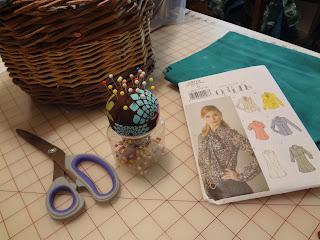I was in Walmart near my sister's and found this handy piece of equipment. It is just a plastic square bottle with a pincushion fastened to the screw-on lid which makes it very handy pinning patterns and sewing. I believe it was around $5-$6.
I have also been searching out different sizes of pins to get some that will go into cheap fabric as well as those of finer qualilty. I ended up buying some longer ones in a smaller width. They are more costly than the regular dressmaker pins. I found some size information here and then I looked in Walmart, JoAnn's, Hancocks, and some quilt stores and found several makers and quite a variety. Prices were about the same and could be less with some coupons from sales flyers. I did get some longer ones in the narrow thickness with glass heads. Some manufacturers do not list the pin thickness, but go by name size, i.e. "super-fine".
Here is a rundown of pin information from Threads Magazine. This was the most helpful chart for me.
.
Dressmaker/all-purpose If in doubt, reach for this medium- length (1-1/16- to 1-1/2-inch) pin. It is appropriate for all sorts of garment sewing.
Thickness
To avoid marring fabric with pin holes, choose the thinnest pin to accomplish the task at hand. Unfortunately, we discovered that the naming convention, as it relates to actual diameters, isn’t consistent among manufacturers. So the best thing to do is roll a pin between your fingers to gauge its actual thickness.
| .4mm, .5mm, .6mm and .7mm or .8mm. |
.4mm The thinnest traditional pin we found was a .4mm “Patchwork Pin (Fine)” by Clover. It passes beautifully through the finest of sheers.
.5mm Called “extra-fine,” “super-fine,” “silk,” or “satin,” these .5mm pins are recommended for fine, lightweight fabrics, including some sheers.
.6mm Most all-purpose pins are labeled “fine,” and are best paired with medium-weight fabrics.
.7mm or .8mm Although harder to find, these diameters are great for thicker fabrics like heavy wools, denim, and quilted layers. But they do leave large holes in their wake.








